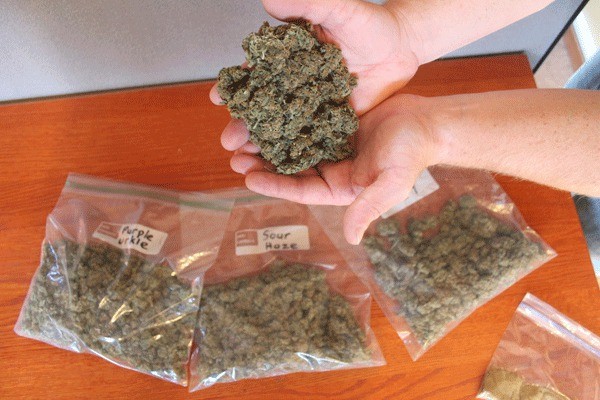It’s three months into a six-month moratorium and Oak Harbor planners are making progress crafting rules for marijuana-related businesses.
It’s unclear, however, if the regulations will ever be used.
So far, nobody has applied for a marijuana-related license for a business inside the city of Oak Harbor, though there’s been more than a dozen applicants for elsewhere in Island County.
Oak Harbor Development Director Steve Powers said the Planning Commission looked at the draft regulations for the second time this week; he expects the members will study it again and possibly pass it on to the City Council in January.
The City Council enacted a moratorium on pot-related businesses in September in order to give planners time to create land-use regulations. Island County commissioners followed suit in November, also with a six-month moratorium.
Under the draft, retail stores are limited to “C-4” commercial and industrial zones. Growing and processing businesses are segregated to industrial and planned business park zones.
Powers said planners created a map that shows where pot businesses can and cannot be located based on state law, as well as the the city’s draft regulations.
Voter-approved Initiative 502, which legalized recreational marijuana, prevents pot businesses from operating within 1,000 feet of schools, churches, daycares and other sensitive uses.
Any marijuana-related businesses in Oak Harbor will likely be located in the north end of town, Powers explained. The map shows that retail pot shops would be allowed on the north end of State Highway 20, Goldie Road and Oak Harbor Road; the growing and processing businesses would be limited to areas on Goldie and Oak Harbor roads.
Other rules proposed in the draft include a ban on drive-through windows for pot sales, a ban on home-based marijuana businesses and a requirement that such businesses be located inside permanent structures.
“We’re looking for a common sense approach to regulating this new type of activity,” Powers said.
The Planning Commission is taking public comment on the proposed regulations. Residents can speak at the next meeting or submit written comments to city.
In the meantime, the Washington State Liquor Control Board is accepting applications for retail, processing and producing businesses until 5 p.m., Dec. 20.
Brian Smith, the spokesman for the agency, said the list of applicants is published each Tuesday until the deadline.
The agency set a quota for the number of retail pot businesses in Island County at four. One is allowed in Oak Harbor and the rest are earmarked for the county at large.
Smith explained there’s no restrictions on the number of grow and processing operations allowed beyond an overall, statewide limit of 2 million square feet of marijuana canopy.
Smith said that amounts to 40 metric tons of pot, which is estimated to be a quarter of the state’s yearly consumption of pot.
So far, six applicants from Whidbey Island have applied for permits as producers. They include two on North Whidbey, two in Freeland, one in Greenbank and one in Langley.
As for the North Whidbey applicants, there’s a proposed business under the trade name “Rockgarden” at an Altair Place location and another called “William EJ Ginn” on Polnell Road.
Four individuals or groups applied for processing licenses, including one each in North Whidbey, Greenbank, Freeland and Langley.
There is only one applicant so far for a retail business in Island County.
The Village Green of Whidbey Island is proposed for Kramer Road in Langley.
Smith said moratoriums on marijuana businesses enacted by local governments won’t affect the state’s issuing of licenses.
Licenses will be awarded to applicants that meet the thresholds of the law and pass background and financial checks.
If the number of retail applicants exceeds quotas for an area, they will be given out by lottery, he said.
Liquor Control will likely issue licenses in March and businesses will probably open in June, Smith said.



